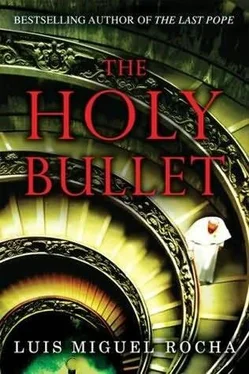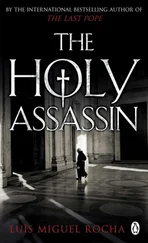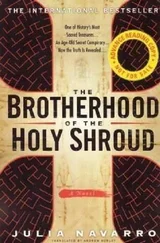“I had the misfortune of finding out about it last year.”
“Who? The murderer of Pope Luciani?”
Marius Ferris made an affirmative gesture.
“Marius…” Don Clemente stared at him in astonishment. “Do you realize what you’re saying?”
“It’s the truth, Clemente. Completely true. He found out that I was guarding the papers and found me. I barely escaped.”
This confession began to become more of a conversation, a revelation, than an actual explication of worldly sins committed by the faithful Marius Ferris, follower of Christ.
“Go on,” Don Clemente told him. “If I keep interrupting you, you’ll never finish.”
“I was captured and held with a group of people who in one way or another also knew about the papers written by the pope. There were four of us. The only ones left. The others had already been murdered. The worst was awaiting us. But thanks to an emissary from the Vatican and a Portuguese journalist who forced an agreement, we all managed to escape, some more wounded than others. Thanks to the Good Lord, I got out unharmed. The papers I am telling you about are valuable only for historical reasons. They contain no information capable of shaking the foundations of our beloved Church. They are the thoughts of a liberal man already dead now. Nothing more. We are all free to think.”
“What you’re telling me is dreadful,” Don Clemente added, still astonished. “Nevertheless, I still haven’t heard a single sin in anything you’ve told me.” A smile spread good-naturedly over his features. “Incidents of destiny, yes. Imponderables of life, also, things that escape our control. But not one sin.”
“Now we’re getting there,” Marius Ferris warned him. “Now,” he repeated.
Don Clemente took the opportunity to rearrange his obese body on the pew, while his friend organized his thoughts.
“During this last year, I’ve done a lot of thinking. I’ve analyzed all my years of work and devotion, as well as those of others. I’ve discovered that there are many people taking advantage of the Church for their own gain, Clemente.”
“I know that well, Marius. But what can one do?”
“Many things. One can change everything.” Visibly irritated with his friend’s resigned attitude, Marius Ferris reproved him. “The work of God has to continue.”
“The work of God serves only the interests of a few.”
“How can you dare say such a thing?” The heat of anger spread over his face. “Over the years I have heard slander, but I never expected to hear it from an intelligent person like you.”
“Marius. You know what is true. You may be well intentioned, Marius. I don’t have any doubt about that, but you yourself said the same thing a little while ago. You celebrate the Eucharist in the comfort of your apartment for a few privileged people.”
“Don’t you understand, Clemente?” He looked hard at him. “Don’t you understand that the soldiers of Christ have to reach every level of society?” He looked around the majestic nave of the cathedral. “Your purpose is to win the poorest. Mine, the richest.”
“Soldiers? Conquer? This isn’t a war, Marius.” His reserved tone reflected an attempt to calm the troubled waters of the conversation.
“There you’re deceived. This is a war. A strategic war. We have enemies outside and inside the Church. And we have to eliminate them all.”
“Listen to yourself, Marius.” The attempt to calm him had not worked. The dialogue had broken down in this confessional conversation. “War? Eliminate enemies?”
“The experience of the last year has made me realize that there are other groups operating in the inner halls of the Vatican. Our Holy See is scheming with these people. And what do they offer us? Nothing. They are not even believers. They only want the money and power they gain from this collaboration.”
“Very well, Marius. You are here to confess, not to complain. Go on, please.” Don Clemente offered these words coolly. No one changes anyone , he thought. As much as you might think the contrary.
Marius Ferris continued, irritated with not having been understood.
“Forgive me, Father, for I have sinned,” he said coldly.
“Tell me that sin,” the other said.
“I was an accomplice in the death of a man.”
Silence. Don Clemente gestured for Marius Ferris to go on.
“And what evil did this man do you?”
“He attacked our Holy Mother Church.”
“And in what way did he commit this act so offensive to our Holy Mother Church?”
“He repudiated the teachings of the Lord and sold his soul to the devil.”
Don Clemente moved about impatiently on the pew. He didn’t like what he was hearing, but so many complaints had passed through the confessional already, on such different subjects, in his long years of service that his mind and heart were immune to shock. What perturbed him was that it was a friend, though long separated from daily familiarity by his work, who offered this nonsense.
“And how did he repudiate the teachings of the Lord?”
“He tried to kill a pope. One of ours tried to murder the Supreme Pontiff. Do you believe it?”
“What are you saying?” Don Clemente must not have heard right.
“You heard right. He tried to murder a pope.” He added nothing more, although the confessor continued to stare intently at him.
“Well… today you don’t cease to amaze me.” He didn’t know what to say.
“What type of penitence does such an act merit?”
Don Clemente pondered the question for a long time. He would never have imagined seeing Marius Ferris again that day, nor that he’d tell him so many things he would prefer not to know. That Pope Luciani was murdered wasn’t news. And the way the Vatican handled the matter was reprehensible. But that was thirty years ago, and Don Clemente was not the sort of man to question the actions of his superiors. It was also widely known that plans to attack the pope continued to this day. Every pope had been a victim of attempts, even if only in thought, on paper, as a project. In practice few had succumbed or been wounded in one. Nevertheless, out of the last three popes, two suffered attacks, one dying and the other gravely wounded, but this was general knowledge. Which of these was Marius Ferris speaking about?
“It isn’t considered a sin when the cause is the sacred institution of Holy Mother Church. So, although complicity in a murder is a grave sin, I can’t assign any penitence for the act,” Don Clemente decreed.
“Thank you, Brother. That is what I wanted to hear,” Marius Ferris said, kissing his hand. “How’s your nephew?”
“He’s well,” the other answered with an expression of appreciation for the memory.
“In that case I won’t take more of your time and will say good-bye. Until we meet again.”
Don Clemente got up, seeing the other do the same, and walked toward the great door of the cathedral.
“Good-bye, Marius.”
Marius Ferris didn’t look back and left the sacred building. Don Clemente, staring vacantly at the door where his colleague had left, remained in the pew, his mind in turmoil. He didn’t notice the man dressed in black approaching him.
“May I help you,” he asked when he noticed the visitor.
“Yes, thank you,” the man responded cordially, while he took something from inside his jacket. “I want you to tell me where the dossier on the Turk is.”
“The what? I have no idea what you are talking about,” Clemente answered, confused.
“Then I don’t need help.”
“In that case, good night.” And with that Don Clemente turned his back on the visitor, shrugging his shoulders.
“It’s not considered a sin when the cause is the sacred institution of Holy Mother Church,” the man said. Don Clemente turned around toward him in time to see a Beretta with a silencer in his hand.
Читать дальше












